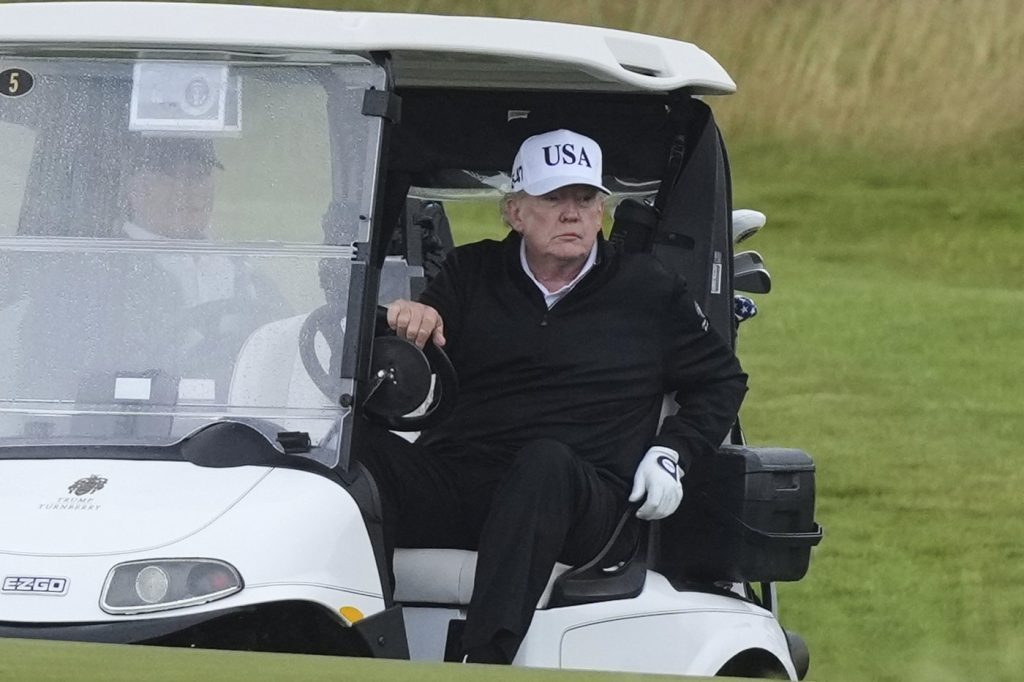EDINBURGH, Scotland (AP) — Former U.S. President Donald Trump is set to meet with European Commission President Ursula von der Leyen on Sunday, taking a brief break from his golfing activities in Scotland. The meeting aims to discuss trade relations, particularly as both sides are looking to negotiate tariff rates ahead of a looming deadline from the White House to impose significant tariffs. The talks come at a critical time, as the implications of a potential deal could affect transatlantic trade.
Trump, who played golf on Saturday at his course in Turnberry, located on the southwest coast of Scotland, is expected to continue golfing throughout his five-day visit. On Tuesday, he will travel to Aberdeen in northeast Scotland, where his family is set to open a third golf course next month. Both Trump and his son Eric plan to participate in a ceremonial ribbon-cutting for the new course, which is scheduled to begin offering public tee times from August 13.
The upcoming meeting with von der Leyen is anticipated to be held behind closed doors, with limited details released prior to the talks. Departing the White House on Friday, Trump noted that there is a "50-50 chance" of reaching an agreement with the European Union. He emphasized that any potential deal would need to address the current proposed tariff rate of 30% impacting the bloc of 27 member states.
In a social media update, von der Leyen stated that she had a productive conversation with Trump prior to their meeting in Scotland, where they agreed to discuss ways to strengthen transatlantic trade relations. The momentum for a deal seemed positive earlier in the month; however, Trump subsequently threatened to impose the aforementioned 30% tariff on European countries. The original deadline for implementing these tariffs has since passed but has been extended until at least the following Friday.
Despite being abroad and enjoying golf, Trump has remained engaged with international trade discussions. Following a round of golf at Turnberry, he announced his intention to block trade agreements between the U.S. and Southeast Asian nations Cambodia and Thailand, amid ongoing violent disputes in border areas. In related tweets, Trump mentioned conversations he had with leaders from both countries, advocating for a ceasefire and expressing a desire for peace and prosperity in the region.
As the likelihood of a successful trade agreement with the EU remains uncertain, Trump previously estimated that reaching a framework with Japan had a 25% chance — a claim that proved inaccurate as an agreement was subsequently announced. His administration has often emphasized the importance of leveraging threats of steep tariffs to negotiate better trade terms globally. However, the results thus far have not met expectations, placing increasing pressure on Trump to secure a deal with the EU, a critical player in global commerce.
Additionally, Trump is scheduled to meet with British Prime Minister Keir Starmer on Monday in Scotland. The two leaders have previously announced a trade framework in May and a larger agreement during the G7 summit in Canada last month. While Trump asserts that this deal is finalized, the White House has indicated that further refinements are still necessary.
Without a finalized deal with the EU, the bloc has signaled its readiness to retaliate with tariffs on numerous American products, which could include everything from beef and auto parts to beer and Boeing airplanes. Trump’s threatened tariffs could lead to increased prices for various European goods in the U.S., impacting a diverse range of products, such as French cheese, Italian leather goods, German electronics, and Spanish pharmaceuticals.











